Have you ever thought about how much food you throw away? It’s bad for your wallet and the planet. By cutting down on food waste, you help the Earth and save money too.
Let’s explore how your food choices affect your health and the planet. We’ll find easy ways to reduce waste and eat better for the Earth. Together, we can make a big difference, one meal at a time!
- Understanding the environmental impact of food waste is essential.
- Reducing food waste benefits both your wallet and the planet.
- Simple, eco-friendly changes in your eating habits can make a significant difference.
- Mindful consumption is key to cultivating sustainable practices.
- Engaging your community can amplify efforts to cut food waste.
Understanding the Environmental Impact of Food Waste
Food waste has a big impact on our planet. It’s shocking to learn that it causes about 8-10% of all greenhouse gas emissions. Food production is a big source of these gases, from farm to trash.
Methane from animals and carbon dioxide from cutting down trees for farms add to the problem. Meat, like beef and dairy, is really bad for the planet because of how it’s made. Knowing this shows why we need to cut down on food waste.
Every little bit we do to reduce food waste helps the planet. By choosing our food wisely, we can make a big difference. It’s all about making our food system more sustainable.
The Hidden Costs of Food Waste

Food waste is often overlooked, but it has big costs. When you throw away food, you waste the effort and resources that went into it. This includes water, fertilizers, fuel, and labor.
Every year, 1 billion tons of food ends up in landfills. This leads to more greenhouse gases. Food waste in landfills makes methane, a gas that harms our planet.
By reducing food waste, we can help the planet. Simple steps in your kitchen can make a big difference. These steps can save money and help the environment.
Working together, we can make a bigger impact. Let’s all try to waste less food. This will help our planet and save money too.
Eating Smart for a Healthier Planet: Cut Food Waste
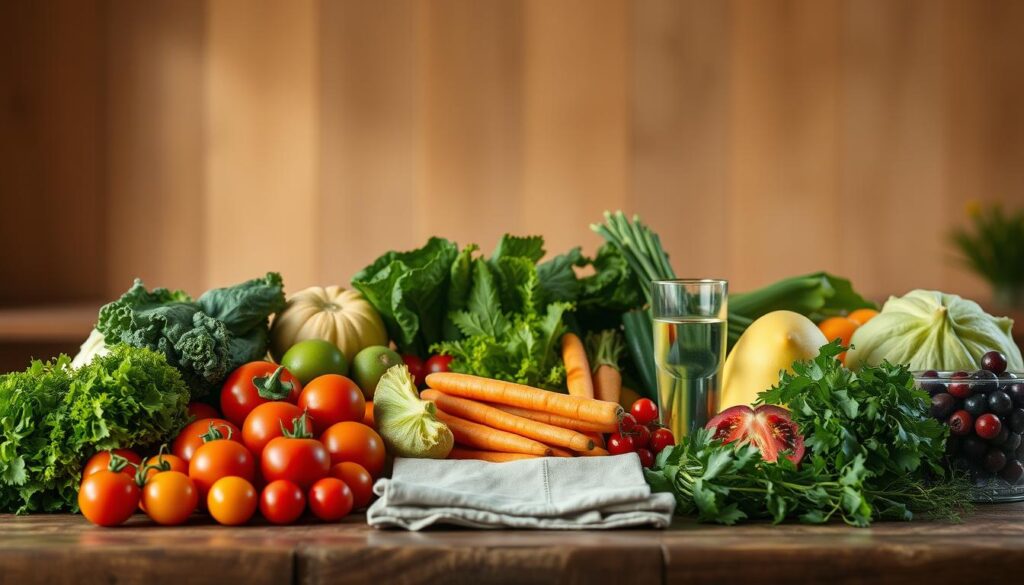
Eating smart means thinking about what we eat. It’s about cutting down on food waste. This helps our planet a lot.
Being careful with food is very important. It helps save food and our planet. Here are some easy steps to help:
- Plan your meals: Make a menu for the week. This stops you from buying too much and wasting food.
- Store properly: Keep fruits, veggies, and leftovers in the right places. This makes them last longer.
- Opt for donations: Give extra food to food banks or local groups.
- Get creative: Turn leftovers into new dishes. This makes waste into tasty meals.
Every small choice we make matters a lot. Eating in a way that’s good for the planet helps us all. It makes us healthier and helps our planet too.
Practical Tips to Minimize Food Waste at Home
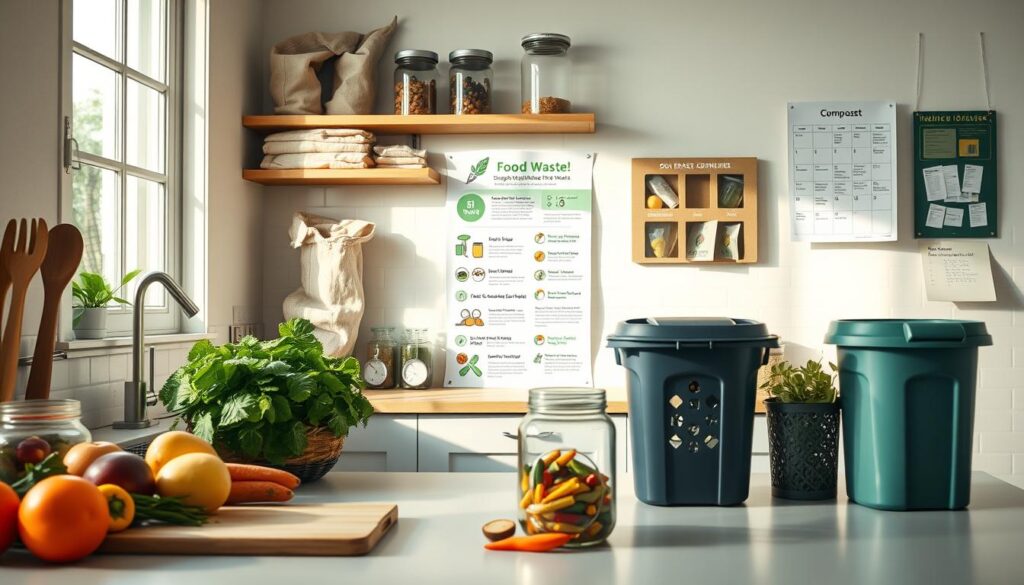
Start by planning your meals. This helps you make a list of what you need. It stops you from buying things on impulse and keeps you from buying too much.
Storing food right is key to keeping it fresh. Store fruits and veggies correctly. Use clear containers to see what you have. Knowing what’s in your pantry helps a lot.
Get creative with leftovers. Turn last night’s dinner into a tasty lunch or freeze it for later. These habits help you use up all your groceries.
Buying imperfect produce helps local farmers and cuts down on waste. Even if it doesn’t look perfect, it’s often great to eat. By doing these things, you can cut down on waste, save money, and help the planet.
Making Eco-Conscious Food Choices
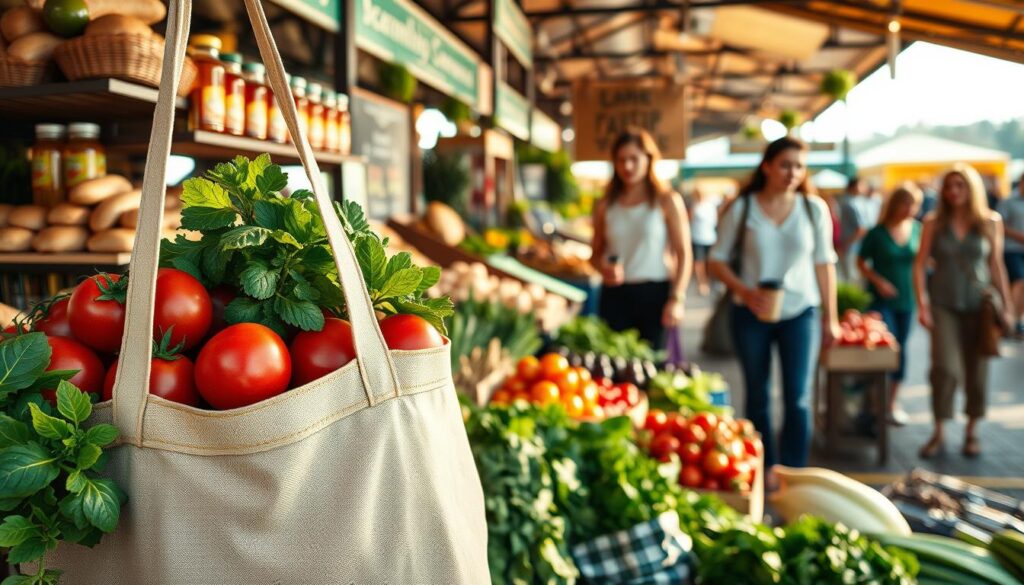
Choosing eco-friendly foods helps our planet a lot. Eating foods that are good for the earth is key. This means picking foods that are grown in a way that’s kind to nature.
By eating foods that are in season and local, we help many things. We support farmers who grow food in a way that’s good for the earth. We also help keep our planet healthy.
Plant-based foods are better for the earth than foods that come from animals. This is because growing plants uses less energy and water. It also makes less pollution.
Here are some ways to make your food choices better for the earth:
- Opt for locally-grown produce to support local economies.
- Choose seasonal fruits and vegetables that require fewer resources to grow.
- Engage in meal planning to minimize waste and select only what you need.
- Look for certifications such as organic or fair trade, which indicate more sustainable practices.
These eco-conscious food choices help make our diet better for the earth. By picking foods that use less, we help reduce pollution. We also support local farmers and a strong food economy.
The Power of Reduction: Strategies to Reduce Food Waste
Reducing food waste helps our planet and saves money. Making weekly meal plans is a good start. It stops you from buying too much food.
Knowing how much food to eat is key. This way, you can enjoy your meals and have leftovers. Also, learning how to store food well keeps it fresh longer.
Using leftovers is another smart move. It saves money and cuts down on waste. Food-sharing programs in communities help too. They share extra food with those who need it.
Health Benefits of Sustainable Eating
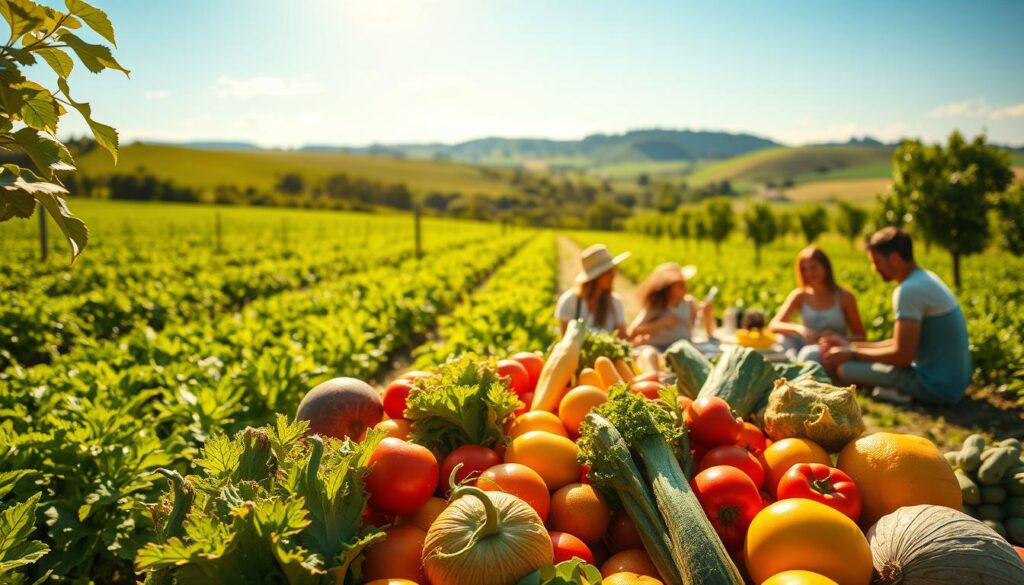
Sustainable eating is good for the planet and for you. It makes your meals healthier. Eating more fruits, veggies, legumes, and whole grains boosts your health.
Studies show that plant-based diets lower disease risks. This includes diabetes and heart disease.
Choosing planet-friendly foods helps your health and the earth. Less meat and dairy means better health and less pollution. Plants give you important nutrients and protect the planet.
Adding sustainable eating to your life has many benefits. You can:
- Improve your heart health by eating less cholesterol.
- Have better digestion with more fiber.
- Feel more energetic with balanced meals.
- Manage your weight with nutrient-rich foods.
Switching to sustainable eating inspires you and others. It helps everyone eat better and waste less food. Together, we can make a big difference for our health and the planet.
Tips for Reducing Food Waste in Your Community
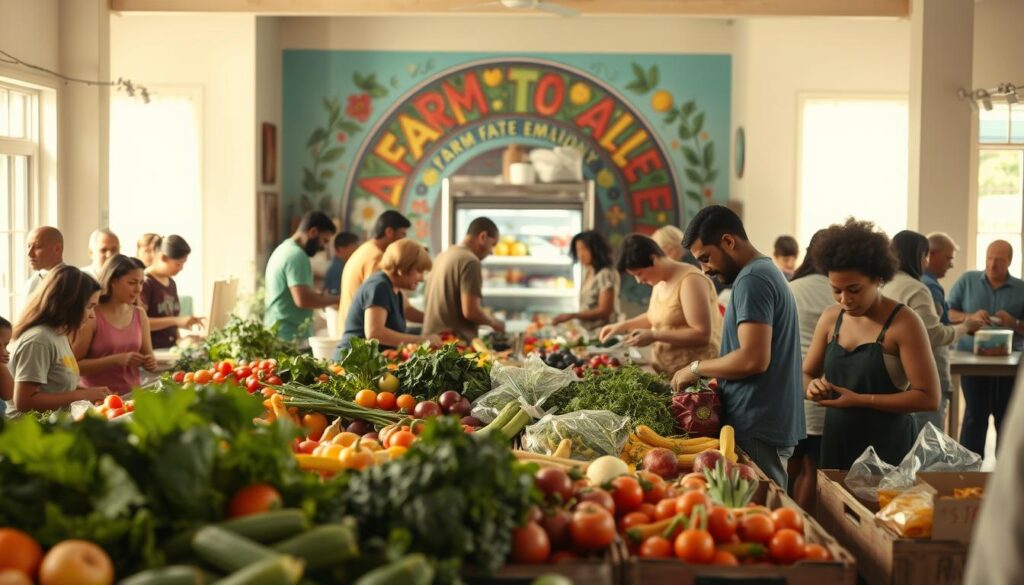
In your community, you can help reduce food waste. Working with neighbors and local groups is key. Here are some easy tips to get you started:
- Start awareness campaigns: Teach others why cutting down on food waste is important. Use workshops and social media to spread the word.
- Initiate community gardens: Make spaces for everyone to grow their own food. This way, you’ll have fresh produce and less need for store-bought items.
- Organize food-sharing events: Host potlucks or food swaps. This lets neighbors share extra food, so nothing is wasted.
- Educate families: Share how to store food right, control portions, and plan meals. This helps everyone eat greener and waste less.
Joining local food efforts helps you connect with neighbors. It also helps the planet. Small actions together can make a big difference.
Innovative Food Waste Solutions

New ways to deal with food waste are important for our planet. Startups and tech companies are working on this. They connect people with extra food from restaurants and stores.
This helps use more food and feeds those who need it. It’s a big step towards a better future.
Composting is becoming popular for businesses. It turns food scraps into something good for farms. This way, companies cut down on waste and help the environment.
Technology helps food recovery systems a lot. It makes sure food gets to people without much waste. New ideas like turning waste into new products are also being tried.
Creating a Planet-Friendly Diet
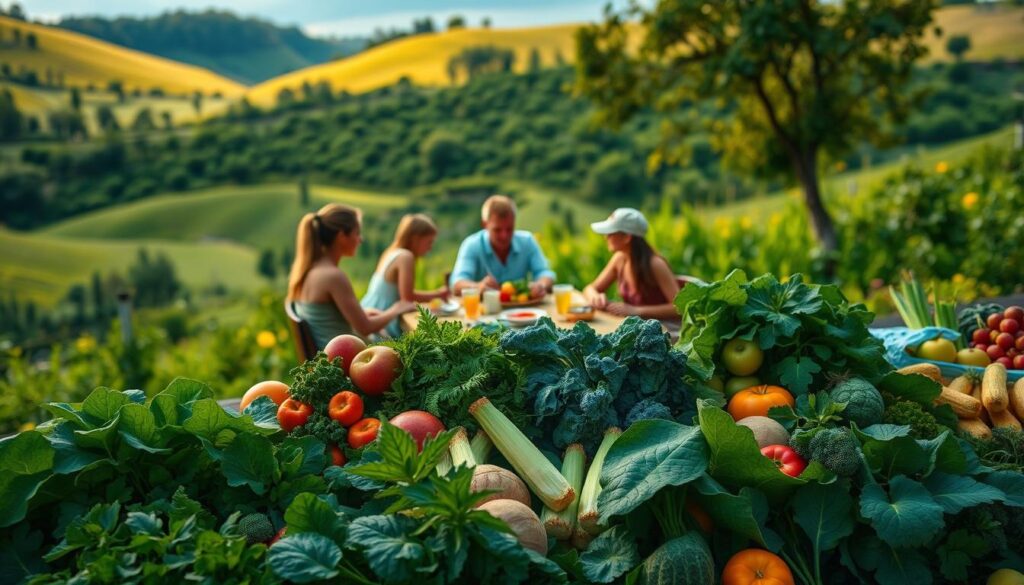
A planet-friendly diet is all about being kind to our planet. It’s about eating foods that are good for you and the Earth. You can eat lots of plant-based foods and eat less meat and processed foods.
Meal planning is key to eating sustainably. You can make tasty plant-based meals that you love. Try new ways with familiar ingredients to keep things interesting.
It’s important to be flexible with your diet. This way, you can enjoy your favorite foods while being kind to the planet. There are many ways to make dishes that are good for the Earth, using lots of plant-based foods.
Mindful Consumption and Its Impact

Mindful consumption is key to lessening our food’s harm to the planet. It makes you think about what you eat and its effects on you and the earth. It teaches you to be thankful for your meals and avoid buying too much food.
Choosing what you eat wisely helps you and the planet. It helps cut down on food waste and supports saving food. This way, you learn to value every meal, caring for your health and the earth.
Every choice you make at the grocery store or at home matters a lot. It can help our planet a lot. Your plate, your impact is what we learn here.
Choosing food wisely and wasting less helps the earth and keeps you healthy. Small actions like composting or planning meals can make a big difference. Your choices can inspire others to be more sustainable too.
It’s all about making a change. Think about your food choices and take action. Together, we can make our planet healthier. Every little bit counts in making our world better.

